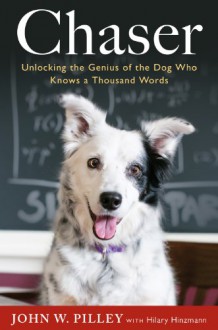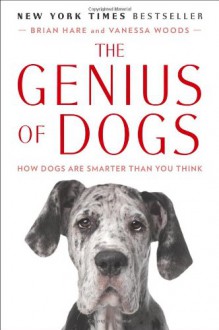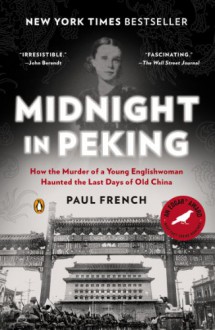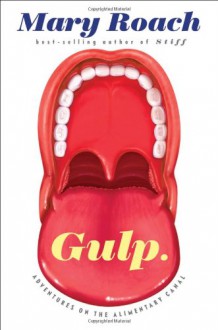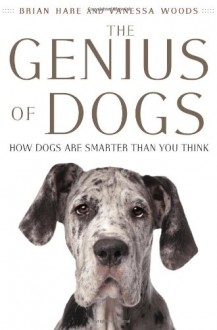
The Zeva Project is my quest to find an activity that Zeva and I can participate in together to relieve her current state of boredom. I am reading nine books, some of which are on the psychology and training of dogs and some which describe specific dog activities.
Fascinating.
This book is all about how dogs are smarter than you think, and refutes the commonly-held beliefs that dogs became stupid when they became domesticated and rank lower on the scale of intelligence than pigs, wolves, dolphins, crows and chimpanzees.
As in most erroneous ideas we have held to be true over the years, the problem has been with the way the subject has been framed, tested and interpreted.
After two decades of research, trials, experimentation and study, "what we know for certain is that the cognitive world of every dog is far more complex and interesting than we thought possible. We also have a tantalizing glimpse into the secret of their success. We can now pinpoint the stuff of dog genius . . . During the process of domestication, dogs evolved a basic understanding of human communicative intentions."
This has been supported by the study of other domesticated animals such as bonobos and a spin-off breed of silver foxes in Siberia. The effect is not duplicated in the study of apes, except for those who have been raised with humans.
Anthropological evidence tells us that dogs and humans began living together about 50,000 years ago. One theory, somewhat radical, proposes that dogs may have been responsible for the further evolution of human domestication.
"Dogs acted as human alarm systems, trackers and hunting aides, garbage disposal facilities, hot water bottles, and children's guardians and playmates. Humans provided dogs with food and security. . . Humans domesticated dogs, and dogs domesticated humans."
Since dogs were an aid in hunting and tracking, those humans who were more tolerant of trying new things, and who were less aggressive and therefore capable of cooperation with others, were the ones who were able to acquire more food and were therefore more successful. It could be argued that dogs helped to civilize man even as men were civilizing dogs.
Since the mid 1990s, due to the study of dogs, and of self-domesticated animals in the wild such as bonobos, "the field of . . . dognition has exploded. From being thought of as an unremarkable animal made stupid by domestication, all of a sudden dogs have become one of the most popular species for animal researchers to study."
One of the dogs in the study has a vocabulary of 4,000 words. He has been tested with upward of more than 1,000 objects, each one with an individual name. When you name a toy, he can successfully retrieve the particular toy. If you show him a duplicate or model of a toy, he will retrieve its match, even if the model is a different size than the original. He can retrieve an object after you show him a picture of an object, and he is aware enough that he can categorize objects. He knows that balls fit in one category and frisbees in another.
Part of the domestication process includes the ability to successfully interact with humans. Dogs are very successful at reading humans, they can follow instructions given by means of gestures, they learn by watching,
" . . the same animal who is an extraordinary communicator is surprisingly dense when it comes to navigating through space or understanding the rules that govern the physical world."
For some reason, they are woefully inadequate at solving mazes or barriers. Most animal intelligence studies in the last century focused on that kind of testing, and that is where the reputation of "less intelligence" originated. They were always outperformed by rats and pigeons.
now that we are starting to recognize better methods to test for dog intelligence, and changing our expectation of what intelligence is, we are beginning to understand just how amazingly smart they are.
"Genius of dogs has two criteria: 1. A mental skill that is strong compared with others, either within your own species or in closely related species. 2. The ability to spontaneously make inferences."
"The dog is arguably the most successful mammal on the planet, besides us. Dogs have spread to all corners of the world, including inside our homes, and in some cases onto our beds. . . . In the industrialized world, people are having fewer children than ever but are simultaneously providing an increasingly lavish lifestyle for a growing population of pet dogs. Meanwhile, dogs have more jobs than ever. Service dogs assist the mentally or physically disabled, military dogs find bombs, police dogs do guard duty, customs dogs detect illegally imported goods, conservation dogs find scat to help estimate population sizes and movements of endangered animals, bedbed dogs detect when hotels have a problem, cancer dogs detect melanomas or even intestinal cancer, therapy dogs visit retirement homes and hospitals to lift spirits and speed recovery."
Even after twenty years of study, there is not a huge amount of completed research, "and not a whole lot of agreement within the research, but that is the fun of a scientific revolution. It is supposed to be a messy, opinionated, data-based conversation. The more data you collect, the louder you get to holler, and that is how progress happens."
This book details many of the studies which have been completed, including the methodology and results, the criteria, selection of subjects and control groups, comparison with comparable testing of other species.
It covered genetics and DNA. There is a minuscule amount of DNA difference from breed to breed. "When talking about breed differences, it all comes down to this: if you think your dog's breed is the best breed, the bad news is, there is no scientific evidence to back you up. But the good news is, there is no evidence to contradict you, either."
There is still much to be studied.
There is still "no formalized training that combines what we know about dog behavior in training with the latest research in dognition. Cognitive training would not only identify the different ways the dogs learn but also identify limitations and biases that can prevent learning. Strategies can then be designed to work around these biases and limitations while tapping into the genius of dog.
I read every word of the book. That is not always the case when I read scientific studies, as I find much of it to be dry and technical, and I skim the parts that look repetitive or uninteresting. Not with this one. It was all good -- well-researched, well-documented, and scholarly without the dull bits.
Except for this observation, for which I felt compelled to deduct half a star:
"The little research that has been done does not suggest maximum reward or training is the most effective technique to shape a dog's behavior.
In humans, rewarding someone for a behavior actually reduces motivation once the reward is reduced or taken away. For instance, say a child enjoys reading, and then you start rewarding her with chocolate for reading. Once you stop rewarding her with chocolate, she is unlikely to enjoy reading for its own sake."
I have to believe that there is no one on this site who would think this statement is true.


 Log in with Facebook
Log in with Facebook 

